An uncontrolled proliferation of cancer cells that begins in the cervix is known as cervical cancer. The lower uterus's narrowest portion is called the cervix. It is the uterine orifice, sometimes known as the womb's neck. Worldwide, women are more likely to develop cervical cancer than any other type of cancer. It ranks as the fourth most common reason for cancer-related deaths among females. Mainly because pap tests and other advanced screening tests are now widely used to identify cervical abnormalities and enable early treatment, there has been a significant decrease in the incidence of cervical cancer.
| Country | Cost | Local_currency |
|---|---|---|
| United Kingdom | USD 8600 - 65987 | 6794 - 52130 |
| Turkey | USD 4800 - 42575 | 144672 - 1283210 |
| Spain | USD 12938 - 34744 | 11903 - 31964 |
| United States | USD 5114 - 74268 | 5114 - 74268 |
| Singapore | USD 5000 - 50000 | 6700 - 67000 |
Treatment cost
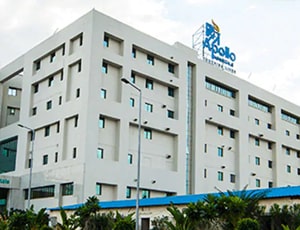
Types of Cervical Cancer Treatment in Apollo Hospital and its associated cost
| Treatment Option | Approximate Cost Range (USD) | Approximate Cost Range (INR) |
|---|---|---|
| Cervical Cancer Treatment (Overall) | 7162 - 10048 | 606518 - 813882 |
| Surgery | 2265 - 5570 | 181227 - 470921 |
| Radiation Therapy | 227 - 888 | 18354 - 72498 |
| Chemotherapy | 339 - 886 | 28081 - 73009 |
| Targeted Therapy | 889 - 1669 | 73558 - 136404 |
| Hormone Therapy | 111 - 334 | 9186 - 27179 |
| Immunotherapy | 2764 - 5725 | 231901 - 458102 |
| Palliative Care | 112 - 333 | 9099 - 28144 |
DOCTORS IN 13 SPECIALITIES
FACILITIES & AMENITIES
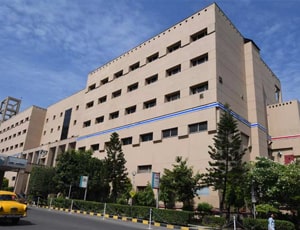
Types of Cervical Cancer Treatment in Apollo Multispecialty Hospitals and its associated cost
| Treatment Option | Approximate Cost Range (USD) | Approximate Cost Range (INR) |
|---|---|---|
| Cervical Cancer Treatment (Overall) | 7351 - 10290 | 588802 - 816947 |
| Surgery | 2260 - 5526 | 181950 - 453710 |
| Radiation Therapy | 222 - 914 | 18204 - 74522 |
| Chemotherapy | 335 - 909 | 27767 - 73219 |
| Targeted Therapy | 919 - 1703 | 75048 - 138682 |
| Hormone Therapy | 111 - 338 | 9404 - 27513 |
| Immunotherapy | 2759 - 5710 | 231829 - 457361 |
| Palliative Care | 113 - 337 | 9239 - 27975 |
DOCTORS IN 13 SPECIALITIES
FACILITIES & AMENITIES

Types of Cervical Cancer Treatment in Memorial Atasehir Hospital and its associated cost
| Treatment Option | Approximate Cost Range (USD) | Approximate Cost Range (TRY) |
|---|---|---|
| Cervical Cancer Treatment (Overall) | 6833 - 11075 | 207761 - 338454 |
| Surgery | 3442 - 6661 | 103087 - 202276 |
| Radiation Therapy | 336 - 1004 | 10394 - 30798 |
| Chemotherapy | 443 - 994 | 13402 - 30342 |
| Targeted Therapy | 991 - 2000 | 30150 - 61288 |
| Hormone Therapy | 133 - 387 | 4066 - 11986 |
| Immunotherapy | 3340 - 5709 | 99799 - 167078 |
| Palliative Care | 172 - 397 | 5038 - 11858 |
DOCTORS IN 13 SPECIALITIES
FACILITIES & AMENITIES


Types of Cervical Cancer Treatment in Fortis Hospital and its associated cost
| Treatment Option | Approximate Cost Range (USD) | Approximate Cost Range (INR) |
|---|---|---|
| Cervical Cancer Treatment (Overall) | 6613 - 9094 | 542965 - 750141 |
| Surgery | 2036 - 5099 | 165903 - 417642 |
| Radiation Therapy | 203 - 809 | 16580 - 66484 |
| Chemotherapy | 305 - 810 | 24946 - 66463 |
| Targeted Therapy | 812 - 1529 | 66477 - 125337 |
| Hormone Therapy | 101 - 305 | 8319 - 24980 |
| Immunotherapy | 2543 - 5088 | 208995 - 414521 |
| Palliative Care | 102 - 303 | 8329 - 24945 |
DOCTORS IN 12 SPECIALITIES
FACILITIES & AMENITIES

Types of Cervical Cancer Treatment in Wockhardt Hospital, Umrao and its associated cost
| Treatment Option | Approximate Cost Range (USD) | Approximate Cost Range (INR) |
|---|---|---|
| Cervical Cancer Treatment (Overall) | 6618 - 9147 | 540802 - 750380 |
| Surgery | 2021 - 5093 | 166172 - 417198 |
| Radiation Therapy | 202 - 814 | 16568 - 66498 |
| Chemotherapy | 303 - 811 | 24898 - 66569 |
| Targeted Therapy | 811 - 1525 | 66550 - 124943 |
| Hormone Therapy | 102 - 303 | 8352 - 24850 |
| Immunotherapy | 2525 - 5059 | 208239 - 416270 |
| Palliative Care | 101 - 305 | 8333 - 24895 |
DOCTORS IN 13 SPECIALITIES
FACILITIES & AMENITIES
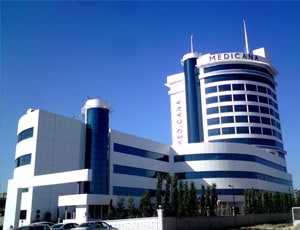
Types of Cervical Cancer Treatment in Medicana Konya Hospital and its associated cost
| Treatment Option | Approximate Cost Range (USD) | Approximate Cost Range (TRY) |
|---|---|---|
| Cervical Cancer Treatment (Overall) | 6827 - 11405 | 207847 - 344303 |
| Surgery | 3303 - 6737 | 103763 - 205146 |
| Radiation Therapy | 344 - 1032 | 10026 - 30415 |
| Chemotherapy | 450 - 1027 | 13399 - 30381 |
| Targeted Therapy | 1011 - 2018 | 29919 - 60226 |
| Hormone Therapy | 136 - 396 | 4088 - 12016 |
| Immunotherapy | 3386 - 5742 | 101163 - 169962 |
| Palliative Care | 169 - 398 | 5102 - 11857 |
DOCTORS IN 9 SPECIALITIES
FACILITIES & AMENITIES

Types of Cervical Cancer Treatment in Fortis La Femme, Greater Kailash II and its associated cost
| Treatment Option | Approximate Cost Range (USD) | Approximate Cost Range (INR) |
|---|---|---|
| Cervical Cancer Treatment (Overall) | 6577 - 9148 | 539400 - 750240 |
| Surgery | 2022 - 5068 | 167016 - 416240 |
| Radiation Therapy | 203 - 810 | 16668 - 66454 |
| Chemotherapy | 304 - 811 | 25025 - 66450 |
| Targeted Therapy | 811 - 1517 | 66286 - 124311 |
| Hormone Therapy | 102 - 306 | 8339 - 24896 |
| Immunotherapy | 2529 - 5066 | 208594 - 414898 |
| Palliative Care | 101 - 306 | 8336 - 24861 |
DOCTORS IN 7 SPECIALITIES
FACILITIES & AMENITIES
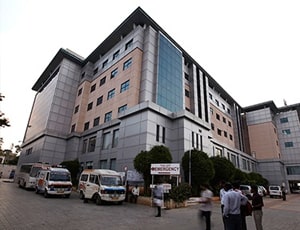
Types of Cervical Cancer Treatment in BGS Gleneagles Global Hospitals and its associated cost
| Treatment Option | Approximate Cost Range (USD) | Approximate Cost Range (INR) |
|---|---|---|
| Cervical Cancer Treatment (Overall) | 7411 - 10029 | 598768 - 839733 |
| Surgery | 2236 - 5628 | 180770 - 470714 |
| Radiation Therapy | 228 - 910 | 18804 - 73283 |
| Chemotherapy | 343 - 916 | 27988 - 72730 |
| Targeted Therapy | 918 - 1675 | 72325 - 137487 |
| Hormone Therapy | 115 - 337 | 9043 - 27717 |
| Immunotherapy | 2813 - 5560 | 228006 - 468220 |
| Palliative Care | 115 - 334 | 9163 - 27913 |
DOCTORS IN 14 SPECIALITIES
FACILITIES & AMENITIES

Types of Cervical Cancer Treatment in Indraprastha Apollo Hospital and its associated cost
| Treatment Option | Approximate Cost Range (USD) | Approximate Cost Range (INR) |
|---|---|---|
| Cervical Cancer Treatment (Overall) | 7250 - 10236 | 595394 - 817276 |
| Surgery | 2240 - 5588 | 186852 - 467133 |
| Radiation Therapy | 229 - 890 | 18168 - 74655 |
| Chemotherapy | 334 - 888 | 27907 - 73734 |
| Targeted Therapy | 894 - 1720 | 73241 - 140971 |
| Hormone Therapy | 113 - 337 | 9413 - 27788 |
| Immunotherapy | 2842 - 5650 | 229477 - 457560 |
| Palliative Care | 114 - 338 | 9429 - 28254 |
DOCTORS IN 14 SPECIALITIES
FACILITIES & AMENITIES

Types of Cervical Cancer Treatment in Manipal Hospital, Yeshwantpur and its associated cost
| Treatment Option | Approximate Cost Range (USD) | Approximate Cost Range (INR) |
|---|---|---|
| Cervical Cancer Treatment (Overall) | 7264 - 10319 | 588846 - 818579 |
| Surgery | 2286 - 5555 | 185900 - 452449 |
| Radiation Therapy | 229 - 912 | 18184 - 73892 |
| Chemotherapy | 335 - 908 | 27209 - 73643 |
| Targeted Therapy | 906 - 1656 | 75349 - 136156 |
| Hormone Therapy | 114 - 344 | 9184 - 27250 |
| Immunotherapy | 2835 - 5593 | 235301 - 453930 |
| Palliative Care | 112 - 333 | 9048 - 27861 |
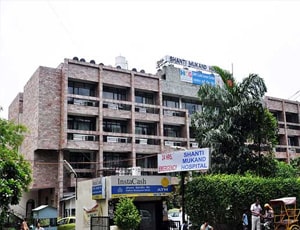
Types of Cervical Cancer Treatment in Shanti Mukand Hospital and its associated cost
| Treatment Option | Approximate Cost Range (USD) | Approximate Cost Range (INR) |
|---|---|---|
| Cervical Cancer Treatment (Overall) | 6591 - 9133 | 541153 - 748698 |
| Surgery | 2030 - 5092 | 166041 - 415793 |
| Radiation Therapy | 203 - 812 | 16711 - 66550 |
| Chemotherapy | 305 - 816 | 25058 - 66559 |
| Targeted Therapy | 812 - 1517 | 66627 - 124692 |
| Hormone Therapy | 102 - 305 | 8303 - 24861 |
| Immunotherapy | 2548 - 5082 | 207671 - 417594 |
| Palliative Care | 102 - 305 | 8363 - 25015 |
DOCTORS IN 11 SPECIALITIES
FACILITIES & AMENITIES

Kaplan Medical Centre located in Rehovot, Israel is accredited by JCI. Also listed below are some of the most prominent infrastructural details:

Types of Cervical Cancer Treatment in VPS Lakeshore Hospital and its associated cost
| Treatment Option | Approximate Cost Range (USD) | Approximate Cost Range (INR) |
|---|---|---|
| Cervical Cancer Treatment (Overall) | 6607 - 9175 | 538584 - 745800 |
| Surgery | 2039 - 5091 | 166369 - 415501 |
| Radiation Therapy | 204 - 808 | 16619 - 66292 |
| Chemotherapy | 306 - 811 | 25049 - 66535 |
| Targeted Therapy | 809 - 1529 | 66777 - 124892 |
| Hormone Therapy | 101 - 304 | 8298 - 24953 |
| Immunotherapy | 2532 - 5086 | 208651 - 416416 |
| Palliative Care | 102 - 305 | 8329 - 24941 |
DOCTORS IN 13 SPECIALITIES
FACILITIES & AMENITIES

Types of Cervical Cancer Treatment in Acibadem Maslak Hospital and its associated cost
| Treatment Option | Approximate Cost Range (USD) | Approximate Cost Range (TRY) |
|---|---|---|
| Cervical Cancer Treatment (Overall) | 6820 - 11372 | 207885 - 333734 |
| Surgery | 3370 - 6669 | 101723 - 200040 |
| Radiation Therapy | 331 - 1033 | 10302 - 30299 |
| Chemotherapy | 444 - 997 | 13263 - 31151 |
| Targeted Therapy | 1021 - 2021 | 31099 - 61783 |
| Hormone Therapy | 134 - 396 | 4104 - 11854 |
| Immunotherapy | 3303 - 5653 | 101993 - 166214 |
| Palliative Care | 165 - 396 | 5158 - 12016 |
DOCTORS IN 10 SPECIALITIES
FACILITIES & AMENITIES

Types of Cervical Cancer Treatment in Acibadem Fulya Hospital and its associated cost
| Treatment Option | Approximate Cost Range (USD) | Approximate Cost Range (TRY) |
|---|---|---|
| Cervical Cancer Treatment (Overall) | 6742 - 11352 | 200214 - 339836 |
| Surgery | 3312 - 6897 | 99858 - 205275 |
| Radiation Therapy | 330 - 1026 | 9956 - 31094 |
| Chemotherapy | 455 - 1033 | 13786 - 30027 |
| Targeted Therapy | 996 - 2060 | 30976 - 61707 |
| Hormone Therapy | 132 - 386 | 4015 - 11718 |
| Immunotherapy | 3368 - 5530 | 102944 - 170903 |
| Palliative Care | 165 - 397 | 5029 - 11656 |
DOCTORS IN 11 SPECIALITIES
FACILITIES & AMENITIES
Cervical cancer is an abnormal growth of cancer cells that starts in the cervix. The cervix is the narrow part of the lower uterus. It is the entrance of the uterus, often referred to as the neck of the womb. Cervical cancer is the fourth most common type of cancer in women around the world. It is the fourth leading cause of death caused by cancer in women. However, the important thing to note is that cervical cancer is also one of the most preventable types of cancer and early diagnosis of the disease can improve the mortality rate amongst patients.
A dramatic reduction in cervical cancer occurrence is primarily due to the widespread use of advanced screening tests such as pap tests to detect cervical abnormalities and allow for early treatment.
Under normal circumstances, the ectocervix is covered with flat, thin cells called squamous cells, and the endocervix is made up of another kind of cells called columnar cells. The area where these cells meet is called the transformation (T) zone. The T zone is the most likely location for cervical cancer cells to develop.
A majority of cervical cancer cases occur because of a virus called human papillomavirus (HPV). HPV is a sexually transmitted virus. It can transfer through sexual contact with an infected male partner.
There are many types of the HPV virus and not all types of HPV cause cervical cancer. Some of the HPV may cause genital warts. Some other cervical cancer risk factors include smoking, weak immune system, oral contraceptives, and multiple pregnancies.
More than 90 percent of the cervical cancers are squamous cell carcinoma. The second most common type of cervical cancer is adenocarcinoma. Adenosquamous carcinomas or mixed carcinomas are some of the rare types of cervical cancer.
The treatment for cervical cancer may vary depending on the stage of the cancer, the patient's overall health, and other factors. Common treatment modalities include:
The recovery process and duration of hospital stays following cervical cancer surgery can vary depending on the type of surgery performed and individual factors. Here's a general overview:
It's very crucial to note that individual recovery experiences may vary, and some women may need more time for healing. After discharge, patients will be advised to follow up with their healthcare team for postoperative care, including monitoring for any signs of complications or infection. Throughout the recovery process, patients are often encouraged to:
Moreover, emotional and psychological support is crucial during the recovery period, and healthcare providers may recommend counseling or support groups to address any concerns or emotional aspects of the journey.
Ask your healthcare adviser for the best multiple options and choose the one that meets your expectations